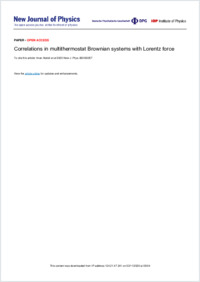Correlations in multithermostat Brownian systems with Lorentz force
- Abdoli, Iman Leibniz-Institut für Polymerforschung Dresden, Institut Theorie der Polymere, 01069 Dresden, Germany
- Kalz, Erik Leibniz-Institut für Polymerforschung Dresden, Institut Theorie der Polymere, 01069 Dresden, Germany
- Vuijk, Hidde D. Leibniz-Institut für Polymerforschung Dresden, Institut Theorie der Polymere, 01069 Dresden, Germany
- Wittmann, René Institut für Theoretische Physik II, WeicheMaterie, Heinrich-Heine-Universit¨at Düsseldorf, 40225 Düsseldorf, Germany
- Sommer, Jens-Uwe Leibniz-Institut für Polymerforschung Dresden, Institut Theorie der Polymere, 01069 Dresden, Germany - Technische Universit¨at Dresden, Institut für Theoretische Physik, 01069 Dresden, Germany
- Brader, Joseph M. Department de Physique, Université de Fribourg, CH-1700 Fribourg, Switzerland
- Sharma, Abhinav Leibniz-Institut für Polymerforschung Dresden, Institut Theorie der Polymere, 01069 Dresden, Germany - Technische Universit¨at Dresden, Institut für Theoretische Physik, 01069 Dresden, Germany -
-
18.09.2020
Published in:
- New Journal of Physics. - 2020, vol. 22, no. 9, p. 093057
English
We study the motion of a Brownian particle subjected to Lorentz force due to an external magnetic field. Each spatial degree of freedom of the particle is coupled to a different thermostat. We show that the magnetic field results in correlation between different velocity components in the stationary state. Integrating the velocity autocorrelation matrix, we obtain the diffusion matrix that enters the Fokker–Planck equation for the probability density. The eigenvectors of the diffusion matrix do not align with the temperature axes. As a consequence the Brownian particle performs spatially correlated diffusion. We further show that in the presence of an isotropic confining potential, an unusual, flux-free steady state emerges which is characterized by a non-Boltzmann density distribution, which can be rotated by reversing the magnetic field. The nontrivial steady state properties of our system result from the Lorentz force induced coupling of the spatial degrees of freedom which cease to exist in equilibrium corresponding to a single-temperature system.
- Faculty
- Faculté des sciences et de médecine
- Department
- Département de Physique
- Language
-
- English
- Classification
- Physics
- License
- License undefined
- Identifiers
-
- RERO DOC 329645
- DOI 10.1088/1367-2630/abb43d
- Persistent URL
- https://folia.unifr.ch/unifr/documents/309116
Statistics
Document views: 72
File downloads:
- bra_cmb.pdf: 243
